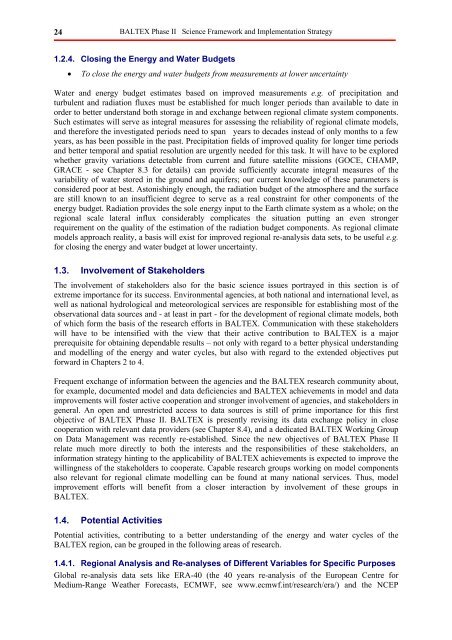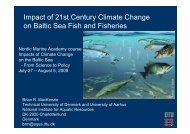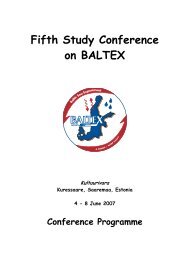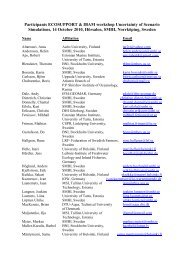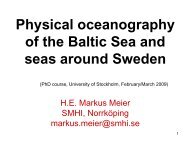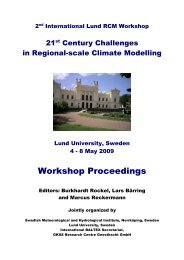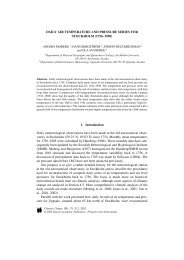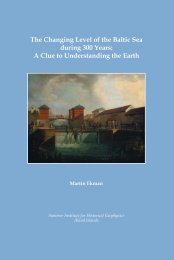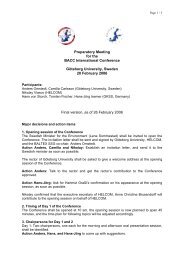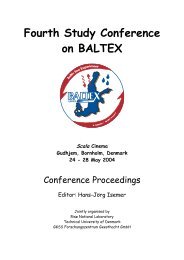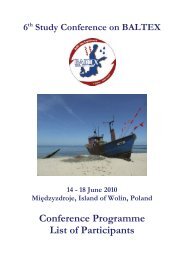BALTEX Phase II 2003 â 2012. Science Framework and ...
BALTEX Phase II 2003 â 2012. Science Framework and ...
BALTEX Phase II 2003 â 2012. Science Framework and ...
You also want an ePaper? Increase the reach of your titles
YUMPU automatically turns print PDFs into web optimized ePapers that Google loves.
24<br />
<strong>BALTEX</strong> <strong>Phase</strong> <strong>II</strong> <strong>Science</strong> <strong>Framework</strong> <strong>and</strong> Implementation Strategy<br />
1.2.4. Closing the Energy <strong>and</strong> Water Budgets<br />
• To close the energy <strong>and</strong> water budgets from measurements at lower uncertainty<br />
Water <strong>and</strong> energy budget estimates based on improved measurements e.g. of precipitation <strong>and</strong><br />
turbulent <strong>and</strong> radiation fluxes must be established for much longer periods than available to date in<br />
order to better underst<strong>and</strong> both storage in <strong>and</strong> exchange between regional climate system components.<br />
Such estimates will serve as integral measures for assessing the reliability of regional climate models,<br />
<strong>and</strong> therefore the investigated periods need to span years to decades instead of only months to a few<br />
years, as has been possible in the past. Precipitation fields of improved quality for longer time periods<br />
<strong>and</strong> better temporal <strong>and</strong> spatial resolution are urgently needed for this task. It will have to be explored<br />
whether gravity variations detectable from current <strong>and</strong> future satellite missions (GOCE, CHAMP,<br />
GRACE - see Chapter 8.3 for details) can provide sufficiently accurate integral measures of the<br />
variability of water stored in the ground <strong>and</strong> aquifers; our current knowledge of these parameters is<br />
considered poor at best. Astonishingly enough, the radiation budget of the atmosphere <strong>and</strong> the surface<br />
are still known to an insufficient degree to serve as a real constraint for other components of the<br />
energy budget. Radiation provides the sole energy input to the Earth climate system as a whole; on the<br />
regional scale lateral influx considerably complicates the situation putting an even stronger<br />
requirement on the quality of the estimation of the radiation budget components. As regional climate<br />
models approach reality, a basis will exist for improved regional re-analysis data sets, to be useful e.g.<br />
for closing the energy <strong>and</strong> water budget at lower uncertainty.<br />
1.3. Involvement of Stakeholders<br />
The involvement of stakeholders also for the basic science issues portrayed in this section is of<br />
extreme importance for its success. Environmental agencies, at both national <strong>and</strong> international level, as<br />
well as national hydrological <strong>and</strong> meteorological services are responsible for establishing most of the<br />
observational data sources <strong>and</strong> - at least in part - for the development of regional climate models, both<br />
of which form the basis of the research efforts in <strong>BALTEX</strong>. Communication with these stakeholders<br />
will have to be intensified with the view that their active contribution to <strong>BALTEX</strong> is a major<br />
prerequisite for obtaining dependable results – not only with regard to a better physical underst<strong>and</strong>ing<br />
<strong>and</strong> modelling of the energy <strong>and</strong> water cycles, but also with regard to the extended objectives put<br />
forward in Chapters 2 to 4.<br />
Frequent exchange of information between the agencies <strong>and</strong> the <strong>BALTEX</strong> research community about,<br />
for example, documented model <strong>and</strong> data deficiencies <strong>and</strong> <strong>BALTEX</strong> achievements in model <strong>and</strong> data<br />
improvements will foster active cooperation <strong>and</strong> stronger involvement of agencies, <strong>and</strong> stakeholders in<br />
general. An open <strong>and</strong> unrestricted access to data sources is still of prime importance for this first<br />
objective of <strong>BALTEX</strong> <strong>Phase</strong> <strong>II</strong>. <strong>BALTEX</strong> is presently revising its data exchange policy in close<br />
cooperation with relevant data providers (see Chapter 8.4), <strong>and</strong> a dedicated <strong>BALTEX</strong> Working Group<br />
on Data Management was recently re-established. Since the new objectives of <strong>BALTEX</strong> <strong>Phase</strong> <strong>II</strong><br />
relate much more directly to both the interests <strong>and</strong> the responsibilities of these stakeholders, an<br />
information strategy hinting to the applicability of <strong>BALTEX</strong> achievements is expected to improve the<br />
willingness of the stakeholders to cooperate. Capable research groups working on model components<br />
also relevant for regional climate modelling can be found at many national services. Thus, model<br />
improvement efforts will benefit from a closer interaction by involvement of these groups in<br />
<strong>BALTEX</strong>.<br />
1.4. Potential Activities<br />
Potential activities, contributing to a better underst<strong>and</strong>ing of the energy <strong>and</strong> water cycles of the<br />
<strong>BALTEX</strong> region, can be grouped in the following areas of research.<br />
1.4.1. Regional Analysis <strong>and</strong> Re-analyses of Different Variables for Specific Purposes<br />
Global re-analysis data sets like ERA-40 (the 40 years re-analysis of the European Centre for<br />
Medium-Range Weather Forecasts, ECMWF, see www.ecmwf.int/research/era/) <strong>and</strong> the NCEP


